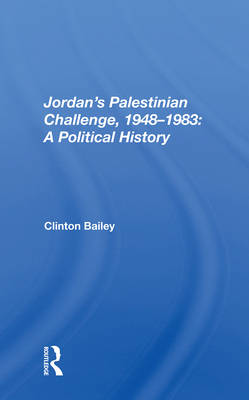
Door een staking bij bpost kan je online bestelling op dit moment iets langer onderweg zijn dan voorzien. Dringend iets nodig? Onze winkels ontvangen jou met open armen!
- Afhalen na 1 uur in een winkel met voorraad
- Gratis thuislevering in België vanaf € 30
- Ruim aanbod met 7 miljoen producten
Door een staking bij bpost kan je online bestelling op dit moment iets langer onderweg zijn dan voorzien. Dringend iets nodig? Onze winkels ontvangen jou met open armen!
- Afhalen na 1 uur in een winkel met voorraad
- Gratis thuislevering in België vanaf € 30
- Ruim aanbod met 7 miljoen producten
Zoeken
Jordan's Palestinian Challenge, 1948-1983: A Political History
A Political History
Clinton Bailey
Hardcover | Engels
€ 182,45
+ 364 punten
Uitvoering
Omschrijving
Two-thirds of all Palestinians are Jordanian citizens living on the East and West Banks; a sizable number also reside and work in various parts of the Arabian Peninsula. With the questions of ultimate sovereignty over the West Bank and the Gaza Strip attracting much international attention since Israel's occupation of these areas in 1967, the solution to the Palestinian question is often seen as entirely dependent on Palestinian relations with Israel, despite the fact that only one-third of the Palestinians live in the occupied territories. In contrast, Palestinian relations with the Arab states, including Jordan, are generally portrayed as a sideshow to the main theater of conflict. This book examines the thirty-five-year struggle between the Hashimite monarchy and the forces of Palestinian nationalism over the future identity, and perhaps location, of those two-thirds of the Palestinian people who have been Jordanian subjects since 1948. Dr. Bailey bases his study on "open" sources: reports appearing in the Arab, Israeli, and world press, in addition to academic studies and published memoirs of persons involved in the events described, providing an accurate portrayal of the significant developments in Jordan's Palestinian challenge over the past thirty-five years.
Specificaties
Betrokkenen
- Auteur(s):
- Uitgeverij:
Inhoud
- Aantal bladzijden:
- 158
- Taal:
- Engels
Eigenschappen
- Productcode (EAN):
- 9780367005368
- Verschijningsdatum:
- 7/06/2019
- Uitvoering:
- Hardcover
- Formaat:
- Genaaid
- Afmetingen:
- 143 mm x 229 mm
- Gewicht:
- 453 g

Alleen bij Standaard Boekhandel
+ 364 punten op je klantenkaart van Standaard Boekhandel
Beoordelingen
We publiceren alleen reviews die voldoen aan de voorwaarden voor reviews. Bekijk onze voorwaarden voor reviews.











